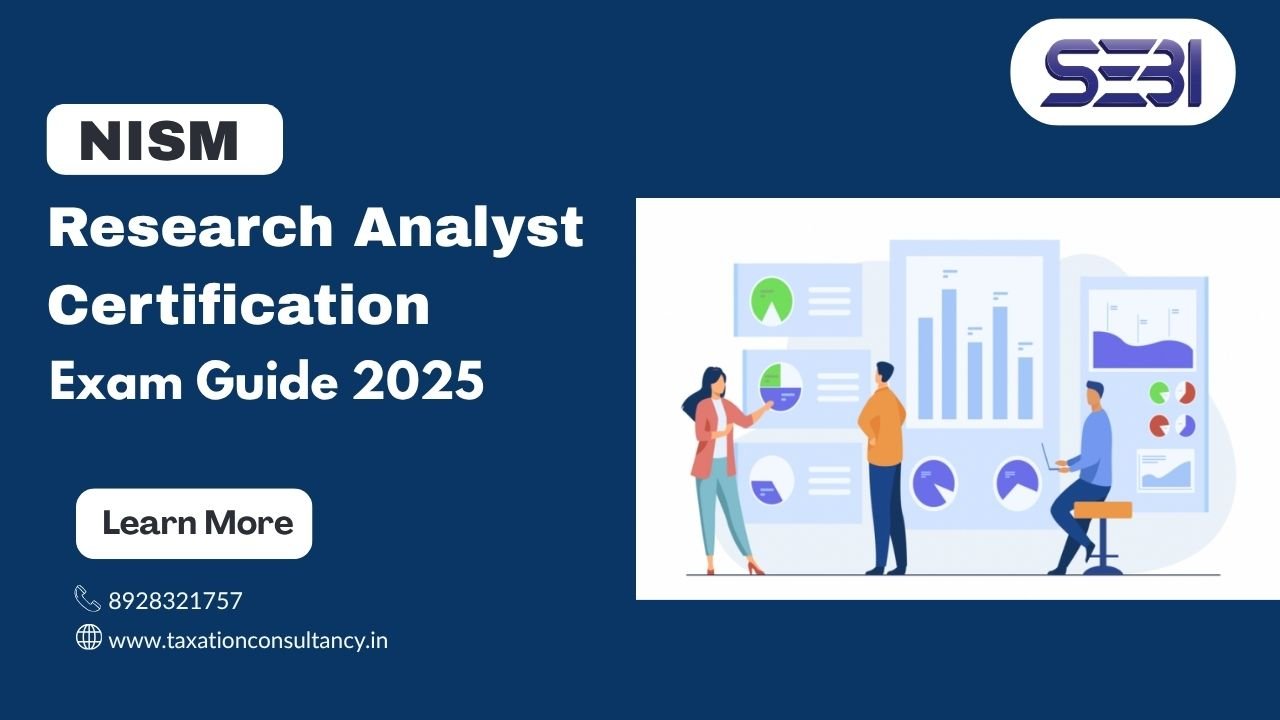NISM Research Analyst Exam – Taxation Consultancy
Introduction
Have you ever wondered how financial experts seem to know exactly which stocks to buy, when to invest, or how to navigate taxes efficiently? Behind those smart decisions lies strong research, analysis, and understanding of financial regulations — the very skills tested in the NISM Research Analyst Exam.
This exam is not just another certification; it’s your gateway to becoming a trusted financial professional, enabling you to offer insightful market research and even explore taxation consultancy as a parallel or complementary field. Whether you’re a finance student, aspiring analyst, or investment enthusiast, understanding the BSE RA Registration and BSE IA (Investment Adviser) process can set you apart in the competitive financial industry.
In this article, we’ll dive deep into the NISM Research Analyst Exam, explore how it connects to taxation consultancy, and discuss how BSE registration processes can shape your financial career.
Learn all about the NISM Research Analyst Exam, BSE RA Registration, and BSE IA for a career in taxation consultancy and investment analysis.
What Is the NISM Research Analyst Exam?
The NISM Research Analyst Exam is a certification examination conducted by the National Institute of Securities Markets (NISM) — an educational initiative by SEBI (Securities and Exchange Board of India).
It’s designed to assess a candidate’s ability to analyze securities, understand market trends, and provide research-backed investment recommendations. Passing this exam allows you to register as a Research Analyst (RA) with SEBI and work in roles that demand market expertise.
Think of it as your license to analyze, just like a driving license lets you drive legally. Without it, offering professional research services in the Indian market isn’t permitted.
Why Is the NISM Research Analyst Exam Important?
In the financial world, credibility is everything. Investors trust professionals who have proven their knowledge and are certified by recognized bodies like NISM.
This exam:
- Builds credibility with clients and employers.
- Enhances your understanding of market fundamentals, valuation, and analysis techniques.
- Opens doors to roles in brokerage firms, investment houses, and consultancy.
- Acts as a foundation for further specializations, including taxation consultancy and BSE IA certification.
In short, it’s your first big step towards becoming a financial problem-solver — someone people turn to for guidance.
Eligibility Criteria for the NISM Research Analyst Exam
The eligibility is refreshingly straightforward.
To appear for the exam, you must:
- Be at least 18 years old.
- Hold a Bachelor’s degree in any discipline (preferably finance, commerce, or economics).
There’s no upper age limit and no prior experience required, making it ideal for students, working professionals, or career changers who want to enter the finance field.
Exam Structure and Pattern
The NISM Research Analyst Exam is conducted online and consists of 100 multiple-choice questions (MCQs).
Here’s the structure in brief:
- Total Marks: 100
- Passing Marks: 60%
- Duration: 2 hours
- Negative Marking: 25% (for every wrong answer)
The exam covers:
- Basics of securities markets
- Fundamentals of research
- Quantitative and qualitative analysis
- Company valuation
- Legal and regulatory environment
Pro Tip: Always focus on understanding concepts rather than memorizing. The questions often test logic and application.
How to Register for the NISM Research Analyst Exam
The process is simple and entirely online.
- Visit the NISM Certification Portal (https://certifications.nism.ac.in).
- Create an account and complete the KYC process.
- Choose “Research Analyst Exam (Series XV)”.
- Select a nearby test center and exam date.
- Pay the registration fee (usually around ₹1,500).
Once you pass, your certificate is valid for three years.
You can then proceed to BSE RA Registration, which allows you to officially operate as a Research Analyst.
Understanding BSE RA Registration
After passing the exam, you’ll need to register with SEBI (through BSE) as a Research Analyst (RA) before offering any investment research or advice.
The process involves:
- Submitting the application form via BSE or NSE platform.
- Uploading your NISM certificate, educational documents, and ID proof.
- Paying the registration fee (around ₹10,000 for individuals).
Once approved, you’ll receive a SEBI RA Registration Number, giving you the authority to publish reports, advise clients, and work under your name or a firm.
This step marks your official entry into the professional world of investment research.
The Role of BSE IA (Investment Adviser) Certification
While BSE RA Registration allows you to analyze and publish research, BSE IA (Investment Adviser) certification enables you to provide personalized investment advice to clients.
Both roles often overlap but serve distinct purposes:
- RA: Focuses on research and data-backed insights.
- IA: Focuses on advising clients based on their goals, risk appetite, and portfolio.
Professionals aiming for a holistic financial career often pursue both certifications — starting with NISM Research Analyst and then moving on to Investment Adviser certification.
NISM Research Analyst vs Investment Adviser – What’s the Difference?
Here’s a quick comparison:
| Feature | Research Analyst (RA) | Investment Adviser (IA) |
| Purpose | Conducts research, prepares reports | Gives personalized investment advice |
| Registration | SEBI RA Registration (BSE/NSE) | SEBI IA Registration |
| Focus | Market trends, company analysis | Client’s goals, portfolio management |
| Ideal For | Analysts, researchers, brokers | Financial planners, wealth managers |
If you enjoy analyzing data and writing reports, RA suits you.
If you prefer one-on-one client interaction and advising, IA might be your calling.
Taxation Consultancy: How It Connects to Research Analysis
Taxation might seem like a completely different domain, but it’s deeply connected to financial research.
A Research Analyst needs to understand how taxes affect investment returns, company profits, and valuation models. Similarly, a tax consultant must know market instruments and financial regulations to guide clients effectively.
For example:
If a company is investing in equity funds, the analyst must account for capital gains tax, dividend distribution tax, and GST implications while evaluating returns.
This interlinking makes Taxation Consultancy a natural career extension for certified research analysts.
Key Taxation Concepts Every Research Analyst Should Know
Here are a few taxation fundamentals every analyst should grasp:
- Capital Gains Tax: Tax on profit from the sale of securities.
- Dividend Taxation: How dividends are taxed in the hands of investors.
- Tax Deducted at Source (TDS): Impact on investment income.
- Corporate Taxation: How company tax rates affect earnings and valuations.
- GST on Financial Services: Relevant for brokers and investment houses.
Understanding these helps you analyze financial statements more accurately and advise clients intelligently.
How to Build a Career in Taxation and Research Analysis
Combining taxation consultancy and research analysis can make you a dual expert, highly sought-after in the financial industry.
Here’s a roadmap:
- Complete your NISM Research Analyst Exam.
- Register with SEBI as a Research Analyst (via BSE RA Registration).
- Pursue certifications in taxation (like ICAI or ICSI courses).
- Work with financial advisory firms or start your own consultancy.
- Continue upgrading your skills with BSE IA certification.
This combination gives you a 360-degree understanding of finance — from tax planning to market research.
Study Tips for Cracking the NISM Research Analyst Exam
Here’s how you can prepare effectively:
- Start with the NISM workbook available on their website.
- Focus on practical applications instead of rote learning.
- Use mock tests and sample papers regularly.
- Keep up with financial news — markets, regulations, and trends.
- Dedicate at least 2 hours daily for 4–6 weeks for thorough preparation.
Remember: Consistency is your best friend. Like compound interest, small daily efforts lead to big results.
Common Mistakes to Avoid During Preparation
Many candidates fail not due to lack of knowledge but due to avoidable mistakes.
Avoid these:
- Ignoring the regulatory and compliance sections.
- Over-relying on notes instead of the official workbook.
- Neglecting mock tests.
- Not revising formulae or key definitions.
Stay calm during the exam and manage time wisely — that’s half the battle won.
Scope and Career Opportunities After Certification
Once certified, you can explore multiple roles:
- Equity Research Analyst
- Investment Strategist
- Taxation Consultant
- Financial Writer or Blogger
- Portfolio Manager’s Assistant
You can work with brokerage firms, banks, AMCs, or fintech startups — or even launch your independent consultancy.
As financial awareness grows in India, demand for certified professionals with NISM, BSE RA, and BSE IA credentials is skyrocketing.
Conclusion and Next Steps
The NISM Research Analyst Exam isn’t just a certification — it’s a career gateway into the world of financial intelligence. Pairing it with Taxation Consultancy skills amplifies your value and opens multiple professional paths.
If you dream of helping people make smarter financial choices, start today. Prepare for the NISM exam, get your BSE RA Registration, explore BSE IA certification, and build a rewarding career that blends research, regulation, and results.
FAQs
1. What is the passing score for the NISM Research Analyst Exam?
You need to score at least 60% to pass the exam.
2. How long is the NISM Research Analyst certificate valid?
The certification is valid for three years from the date of passing.
3. Can I offer investment advice after passing the NISM Research Analyst Exam?
Not directly. You’ll need to register as an Investment Adviser (BSE IA) to provide personalized advice.
4. Is taxation consultancy related to research analysis?
Yes. Both fields overlap in financial planning, valuations, and understanding how taxes affect investments.
5. What are the career prospects after completing the exam?
You can work as a research analyst, consultant, financial planner, or taxation expert in leading financial institutions or independently.










Leave a Reply